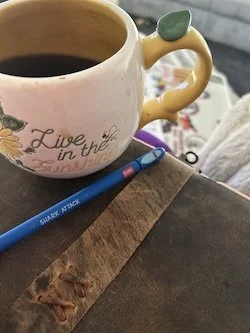You Don’t Need Prompts to Journal: How to Start Writing for Clarity, Healing, and Legacy
Journaling doesn’t have to be perfect. Whether you’re healing, reflecting, or capturing everyday joy, your words matter. Watch me journal in real time—no prompts, no pressure—just a moment of stillness, cafecito, and self-connection.
If you landed here, chances are you're feeling the urge to start journaling—or maybe your therapist suggested it, or TikTok told you it would change your life. Either way, welcome. You're in the right place.
Now, let’s clear something up real quick before you start side-eyeing your screen:
You. Don’t. Need. Prompts.
That’s right—no fancy prompts required. (I know, very Gen Z of me to say. Or is that millennial? Honestly, I’ve lost track.)
When I first started journaling, I was obsessed with finding the perfect list of prompts. I thought I needed structure, direction, or some Instagrammable quote to get started. But here’s the truth: journaling is just you and your thoughts. That’s it.
Whether you're using a notebook, the Notes app on your phone, or shouting into a Google Doc (been there), journaling is about getting those thoughts out of your head and onto something else—so you can breathe a little easier.
I journal to clear out imposter syndrome, kick intrusive thoughts to the curb, and make space for gratitude and clarity. Sometimes it’s messy. Sometimes it’s magical. But it’s always mine—and it can be yours, too.
So, before you go hunting for the perfect aesthetic prompt list, stay with me. I’ve got some real talk, some helpful tips, and yes, a few prompts if you really want them.
1. Why Journal in the First Place?
Journaling is my go-to emotional release (yes, I angry-write sometimes—shoutout to the pen that’s been through it). It’s how I de-stress, practice my cursive, and process all the chaos in my brain. I hope the people who come after me can read my handwriting, but let’s be real—I might need to leave behind a professional cursive translator. 😅
And for my fellow “give me the facts” people—1Dr. James W. Pennebaker, a social psychologist at the University of Texas at Austin, conducted a study titled Disclosure of Traumas and Immune Function. He found that people who wrote about emotional experiences for just 15–20 minutes a day over four days saw significant improvements in:
✅ Mental well-being
✅ Immune function
✅ Fewer visits to health professionals
Journaling isn’t just a TikTok trend or a cute productivity hack—it’s backed by science, and it’s a legit healing tool.
2. You Don’t Need Prompts (But Here’s Why That’s Empowering)
I started journaling during the peak of lockdown in 2020. Back when we had nothing but time and vibes. My early journals? Full of drawings, fancy lettering, and a borderline obsession with Pinterest-inspired spreads. I’d spend hours searching for the “perfect” prompt. And hey, that served me then.
Fast forward five years—and several journals later—the stickers are gone, the washi tape has retired, and now it’s just me, a pen, and the page. I still use colorful pens to keep it fun, but now I write from instinct. Sometimes it’s cursive, sometimes print. Sometimes I just write one word.
Here’s the thing: the thought won’t leave my brain until I write it down, like a craving for a chocolate chip cookie. Once it’s out, I feel a sense of relief. So, I write it out, let it go, and move on. You don’t need a prompt; you need the courage to start.
Journaling
A cozy journaling scene featuring a warm cup of coffee in a “Live in the Sunshine” sunflower mug, a brown leather journal with stitched initials, and a blue pencil labeled “Shark Attack.” This calming setup captures a mindful morning moment of reflection and intentional living.
3. How to Actually Start Journaling
The best part? There are no rules. Pen and paper, Google Docs, your phone’s Notes app; pick what works.
Start small:
✨ Mornings: Write for 5 minutes after your meditation and with coffee.
🌙 Evenings: Reflect on one good thing from the day. Gratitude helps you sleep better, I swear.
Challenge: DO NOT get on your phone after journaling. Seriously. Let your brain marinate in that clarity.
And remember—no one’s reading this (at least not yet), so don’t overthink it.
4. Journal Like It’s a Legacy
This isn’t just for you—it’s for your kids, grandkids, great-grandbabies. 📝 Journaling captures the real you. The one who cried, laughed, dreamed, failed, got back up, and kept going. This is your history book. Your way to heal ancestral wounds and pass on wisdom. Your voice deserves to echo.
5. Okay Fine, You Still Want Prompts? I Got You.
You’re not Regina George (Mean Girls, for those who don’t know) writing in a burn book (LOL please don’t do that), but here are some prompts to get your wheels turning:
What am I grateful for today?
What lesson did I learn today?
What did I dream about?
What’s keeping me up at night? Is it true? What’s the solution?
Draw something that makes you happy. Now write about it.
Start your bucket list—then write about the first thing you complete.
What’s annoying me today, and how can I release it?
I wonder... (Finish that sentence. Let it take you somewhere.)
📚 Reference:
1. Pennebaker, J. W., & Beall, S. K. (1986). Confronting a traumatic event: Toward an understanding of inhibition and disease. Journal of Abnormal Psychology, 95(3), 274–281.

